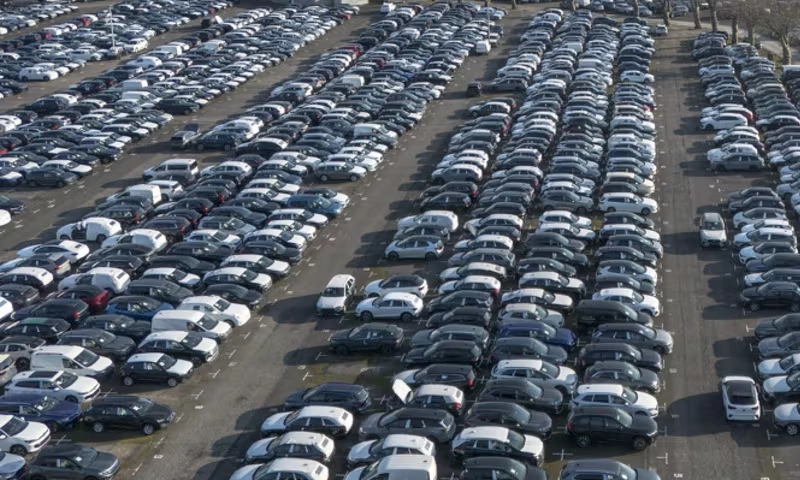- Web Desk
- 5 Hours ago
US auto tariffs shake global industry as price hikes, job losses loom
-

- Reuters
- Mar 27, 2025

BERLIN/DETROIT: The United States’ announcement of a 25 per cent tariff on auto imports rippled throughout the world on Thursday, as global vehicle suppliers warned of immediate price hikes and dealers raised fears of job losses in countries with a large car industry.
Europe’s auto industry called for a transatlantic deal to avert the tariffs announced by US President Donald Trump on Wednesday, hammering stocks and testing already strained ties with allies.
The new levies could add thousands of dollars to the cost of an average vehicle in the U.S., contradicting Trump’s promises to combat consumer inflation and further dampening demand at a time when the sector is already struggling to manage the transition to electric cars.
The American Automotive Policy Council, which represents the Detroit Three automakers, said in a statement late on Wednesday that “U.S. Automakers are committed to President Trump’s vision of increasing automotive production and jobs in the U.S. and will continue to work with the Administration on durable policies that help Americans.”
The AAPC added that it is “critical” that the tariffs are implemented in a way that avoids price hikes for consumers.
Barclays analysts called the tariff move a “more draconian outcome than most anticipated,” adding that “there are no ‘winners’ in the absolute – only relative winners, with a significant amount of cost set to be introduced into the industry.”
Germany’s BLG Group, port logistics provider for one of the world’s busiest auto shipping terminals in Bremerhaven, said it was planning for a 15% reduction in traffic as a result of the tariffs, which will take effect on cars from April 3 and auto parts from May 3.
In Spain, the second-largest vehicle manufacturing country in the European Union, car dealer association Faconauto said a drop in demand for Spanish-made cars and parts could impact employment and future investment in the region.
French car parts supplier Valeo VLOF.PA said it would have no choice but to hike prices, while BMW, also a major exporter of cars from the U.S. to Europe, said a trade conflict between the two economic regions would not have any benefits.
“Both sides should therefore promptly find a transatlantic deal that creates growth and prevents a spiral of isolation and trade barriers,” it said in a statement.
“CHAINSAW-LIKE POLICIES”
Volkswagen VOWG.DE, BMW BMWG.DE, Mercedes-Benz MBGn.DE, Porsche P911_p.DE and Continental CONG.DE lost 5.5 billion euros ($5.93 billion) in combined market value on Thursday, highlighting investor concern at the prospect of more costs and complexity.
“While tariffs were expected, we still expect a clearly negative reaction: consensus will decline, outlooks will be cut, efficiency will be lowered,” said analyst Daniel Schwarz at Stifel Research.
Carmakers must now decide whether to localise more production in the U.S., swallow the costs of tariffs, or pass them onto consumers.
Companies including Volvo CarsVOLCARb.ST, Volkswagen’s Audi, Mercedes-Benz and Hyundai 005380.KS have already said they will move some production to the region this year.
But some CEOs have, in private, expressed reluctance to make long-term business decisions based on what could be a short-term policy.
“These policies have already made equity and debt markets extremely nervous, and we know that the president regards the Dow Jones index as a key barometer of his success,” analysts at Bernstein Research said in a note.
“It is hard to judge the duration of such chainsaw-like policies if these cause a market slump that does not appear to be transitory,” they added.
A basket of European car and car parts stocks .SXAP was down 2.4% at its lowest since early January at 1252 GMT, regaining some ground after falling as much as 3.4% earlier.
Stellantis STLAM.MI was down 4.6%, extending its year-to-date losses to 14%. Germany’s Porsche P911_p.DE dropped 4.5%, bringing its losses this year to 18%. JLR parent Tata Motors TAMO.NS and Sona Comstar, Tesla’s biggest supplier, ended the Indian trading day nearly 6% lower.
NON-US CONTENT TO BE TAXED
Nearly half of all cars sold in the U.S. last year were imported, according to research firm GlobalData, with vehicles often crossing between Canada, Mexico and the U.S. multiple times in the production process.
By mid-April, automotive services provider Cox Automotive expects disruption to “virtually all” North American vehicle output, leading to 20,000 fewer vehicles a day, about 30% of production.
Trump reiterated that he expected the tariffs to prompt automakers to boost investment in the United States, instead of Canada or Mexico.
Automakers in North America have largely enjoyed free trade status since 1994. Trump’s 2020 U.S.-Mexico-Canada Agreement (USMCA) imposed new rules to spur regional content production.
After clamping tariffs of 25% on Mexico and Canada in early March, Trump allowed a one-month reprieve for vehicles produced in compliance with the terms of his USMCA.
The new rules do not extend that reprieve.
Importers of cars made in the North American region will get the chance to certify their U.S. content so that only non-U.S. content is taxed, the White House said.




